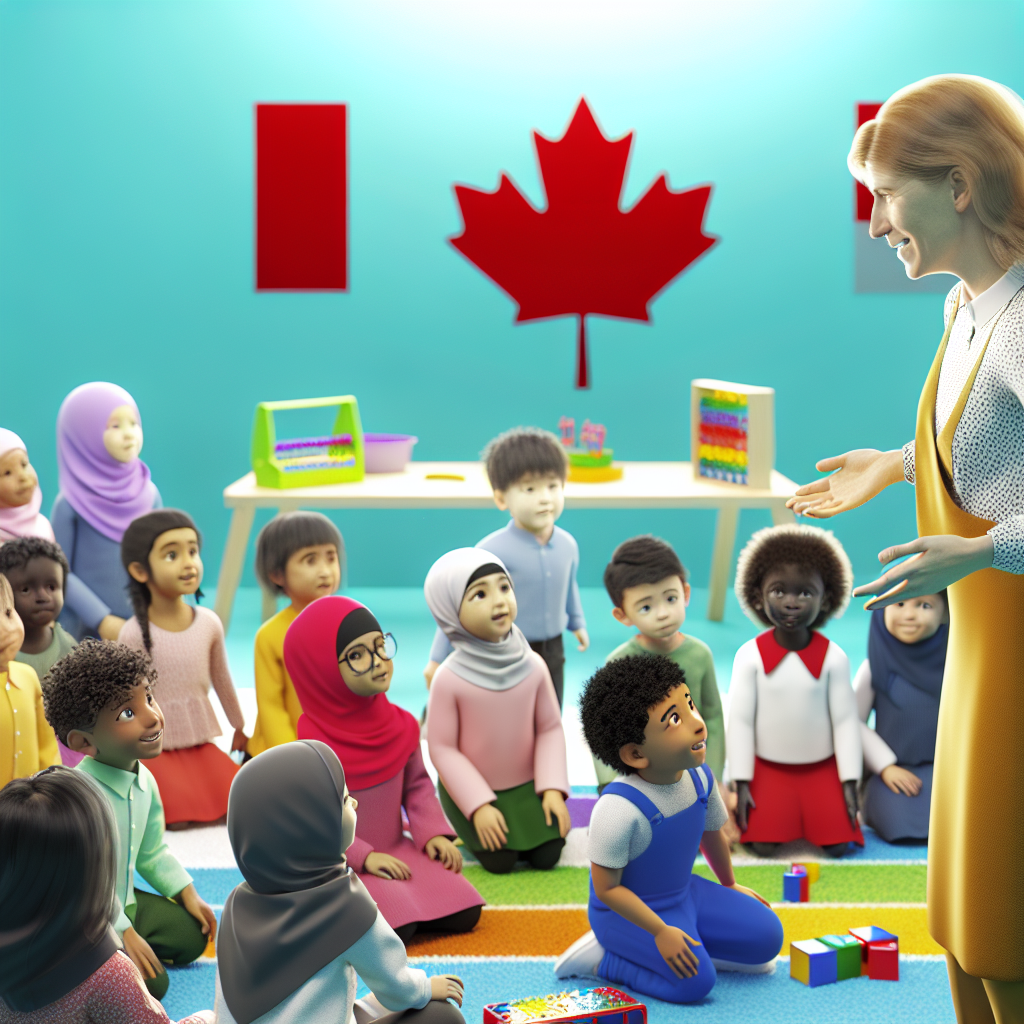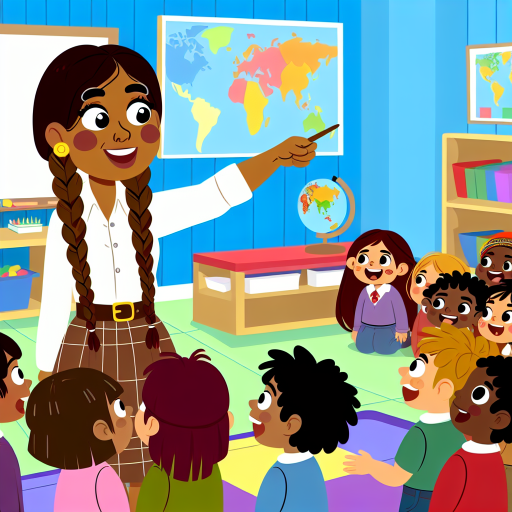Understanding the Role of an Early Childhood Educator in Canada
Defining Early Childhood Education
Early childhood education focuses on the developmental needs of young children.
This phase covers education from birth to age eight.
Educators support children’s physical, emotional, social, and cognitive growth.
Key Responsibilities
Early childhood educators create safe and nurturing environments.
They design age-appropriate activities that stimulate learning.
Furthermore, they assess children’s progress and tailor programs accordingly.
Collaboration with parents is essential for child development.
Additionally, educators often promote positive behavior and social skills.
Qualifications Required
In Canada, becoming an early childhood educator requires specific qualifications.
A degree or diploma in early childhood education is typically necessary.
Practical experience through internships or placements is also vital.
Moreover, certification may include background checks and health assessments.
Importance of Early Childhood Education
Research shows that early childhood education significantly impacts future success.
Children develop essential skills such as critical thinking and communication.
Moreover, educators play a key role in fostering emotional intelligence.
This foundation supports lifelong learning and adaptation to challenges.
Continuous Professional Development
Early childhood educators must engage in ongoing professional development.
Workshops and conferences are excellent for up-to-date practices.
Additionally, educators can pursue certifications in specialized areas.
This commitment enhances their skills and benefits the children they teach.
Education and Qualifications Needed for Certification
Overview of Educational Requirements
To become a certified early childhood educator in Canada, specific educational requirements exist.
Generally, you need to complete a diploma or degree in early childhood education.
This education should be recognized by your provincial regulatory body.
Additionally, institutions often require coursework in child development and pedagogy.
Choosing the Right Program
Selecting an appropriate early childhood education program is crucial.
Unlock Your Career Potential
Visualize a clear path to success with our tailored Career Consulting service. Personalized insights in just 1-3 days.
Get StartedLook for programs accredited by the Canadian Child Care Federation.
Consider programs that offer practical experience through internships or placements.
This hands-on training can enhance your learning significantly.
Academic Prerequisites
Before enrolling in an early childhood education program, ensure you meet the academic prerequisites.
Most institutions require a high school diploma or equivalent for admission.
Some programs may favor candidates with related volunteer or work experience.
Research each program’s specific entry requirements for clarity.
Gaining Practical Experience
Practical experience is essential for prospective educators.
Many programs include fieldwork or practicum components.
Engaging with children in real-life settings builds confidence and competence.
Be proactive in seeking opportunities to connect with children in educational environments.
Certification Examination
After completing your educational requirements, you must pass a certification examination.
This exam assesses your knowledge and understanding of early childhood education principles.
Prepare thoroughly to meet the standards set by your provincial regulatory body.
Study guides and practice tests are often available to assist you.
Continuing Education and Professional Development
Once certified, engage in continuing education to maintain your certification.
Participate in workshops, seminars, and additional courses relevant to early childhood education.
Staying updated with new research and methodologies enhances your skills.
Your commitment to professional development will positively impact your teaching effectiveness.
Meeting Provincial Requirements
Each province in Canada has specific requirements for early childhood educators.
Familiarize yourself with the regulations in your province or territory.
Regulatory bodies provide resources to help navigate certification processes.
Ensure that you adhere to all necessary guidelines to maintain your certification.
Steps to Obtain a Degree or Diploma in Early Childhood Education
Research Educational Institutions
Begin by exploring colleges and universities offering early childhood education programs.
Look for accredited institutions recognized by appropriate provincial authorities.
Compare programs to find one that suits your educational and career goals.
Understand Program Requirements
Each program has specific admission criteria that applicants must meet.
Review the prerequisites for your chosen program, including grades and personal statements.
Many programs require you to submit letters of recommendation.
Complete Application Process
Gather all necessary documents before submitting your application.
Ensure that you meet all deadlines to avoid missing out on enrollment.
Follow up with the admissions office to confirm the status of your application.
Navigate Financial Aid Options
Explore scholarships, grants, and student loans available for early childhood education students.
Complete the necessary forms to apply for financial assistance.
Speak with a financial advisor at your institution for personalized advice.
Enroll in Coursework
Once accepted, review your course schedule and plan your semesters.
Attend orientation sessions to familiarize yourself with campus resources.
Join study groups to enhance your learning experience and build relationships.
Gain Practical Experience
Most programs include practicum placements or internships in early childhood settings.
Seek opportunities to work in local daycares, preschools, or community centers.
Hands-on experience is vital for applying theoretical knowledge effectively.
Prepare for Certification
Research the certification requirements specific to your province or territory.
Collect all necessary documentation and proof of completed education.
Study for any required exams that demonstrate your competency in early childhood education.
Apply for Certification
Complete the application process through your provincial certification body.
Submit all required documents along with your application fee.
Prepare for a possible interview or additional assessments as needed.
See Related Content: Career Advice for Aspiring Youth Program Facilitators
Field Placement Requirements and Importance
The Role of Field Placement
Field placement serves as a vital component of early childhood education training.
It helps aspiring educators gain hands-on experience in real-world settings.
This practical exposure is essential for developing teaching skills and confidence.
Requirements for Field Placement
Field placement requirements vary by province and educational institution.
Typically, candidates must complete a specified number of hours in a licensed setting.
Additionally, candidates need to demonstrate competencies defined by their training programs.
The Importance of Practical Experience
Real-world experience enhances theoretical knowledge gained in the classroom.
It allows future educators to apply developmental theories in practical situations.
This process fosters a deeper understanding of children’s needs and behaviors.
Building Professional Relationships
Field placements encourage the development of professional networks.
They provide opportunities to connect with experienced educators and mentors.
These relationships can lead to job opportunities and valuable advice.
Reflection and Feedback
Field placements facilitate constructive feedback on teaching practices.
Mentors often provide insights that can significantly enhance teaching methods.
Reflecting on these experiences contributes to professional growth.
Essential Preparation for Educators
In summary, field placements are essential for future early childhood educators.
They bridge the gap between theory and practice while fostering essential skills.
Ultimately, this experience prepares educators for successful careers in teaching.
Discover More: How Technology Is Changing the Role of Early Childhood Educators
Understanding the Certification Process in Your Province or Territory
Research Certification Requirements
Begin by researching the specific requirements in your province or territory.
Each region has distinct rules for early childhood educator certification.
Access official government websites to find up-to-date information.
Review the qualifications needed to become certified.
Common elements include education, experience, and background checks.
Pursue the Necessary Education
Enrolling in a recognized early childhood education program is vital.
Look for institutions with accreditation from provincial authorities.
Courses typically cover child development, curriculum planning, and classroom management.
Consider completing a diploma or degree program for more comprehensive training.
Gain Practical Experience
Obtaining hands-on experience is essential for certification.
Participate in internships or student teaching opportunities.
Collaborate with experienced educators in real classroom settings.
This training builds crucial skills and confidence for future employment.
Complete Required Assessments
Prepare for any assessments mandated by your province or territory.
These assessments often measure your knowledge and skills in early childhood education.
Utilize study guides and practice exams to enhance your preparation.
Successfully completing these assessments is necessary for certification.
Submit Your Application
Gather all required documents for your certification application.
This may include transcripts, proof of experience, and assessment results.
Check the official application guidelines in your province or territory.
Submit your application within the designated time frame.
Stay Informed on Continuing Education
Once certified, consider continuing education to maintain your credentials.
Many provinces require professional development courses periodically.
These courses help you stay current with best practices in early childhood education.
Stay updated on changes in local regulations and educational standards.
Explore Further: Exploring Workplace Settings for Early Childhood Educators
Continuing Education and Professional Development Opportunities
Importance of Ongoing Learning
Continuing education enhances your skills as an early childhood educator.
It keeps you informed about the latest educational practices.
Moreover, ongoing learning boosts your career prospects.
Available Professional Development Programs
Many institutions offer valuable professional development programs.
Such programs may include workshops, conferences, and online courses.
For instance, the Early Childhood Educators of BC provides a variety of options.
- Workshops on child development.
- Seminars on inclusive education.
- Online courses to fit your schedule.
Networking Opportunities
Networking is crucial for professional growth.
Engaging with peers can lead to new ideas and collaborations.
Consider joining local and national associations.
- The Canadian Child Care Federation.
- Provincial early childhood education associations.
Certification Programs
Many universities offer certification programs for early childhood education.
These programs often require a combination of coursework and practical experience.
For example, the University of Toronto offers a recognized diploma program.
Online Learning Platforms
Online learning provides flexible options for busy professionals.
Websites like Coursera and edX offer relevant courses.
Additionally, you can access resources from organizations like the National Association for the Education of Young Children.
Staying Updated with Research
Keeping up with the latest research is essential in this field.
Reading journals and publications helps you incorporate new strategies.
Organizations also provide newsletters to keep you informed.
Mentorship and Community Resources
Finding a mentor can greatly enhance your professional development.
A mentor provides guidance and support throughout your career.
Furthermore, community resources can also offer support and information.
- Local libraries often provide workshops.
- Community centers may host educational events.
Explore Further: Daycare vs. Preschool Roles for Early Childhood Educators

The Importance of Criminal Record Checks and Clearances
Ensuring Safety in Educational Environments
Criminal record checks are crucial for protecting children in educational settings.
They help identify individuals who may pose a risk to children’s safety.
As a result, clearances are a standard requirement for early childhood educators.
Building Trust with Parents and the Community
Parents want to ensure their children are safe in daycare and learning environments.
Displaying a clean criminal record builds trust and confidence among parents.
Moreover, it reassures the community about the integrity of educational institutions.
Legal Requirements and Organizational Policies
Each province in Canada has specific legal requirements regarding background checks.
Organizations often have additional policies for screening staff and volunteers.
Understanding these requirements is vital for aspiring educators.
The Process of Obtaining Criminal Record Checks
Criminal record checks typically require individuals to submit an application.
Applicants can often request checks through local police services.
Additionally, many organizations offer online applications for convenience.
Types of Clearances Needed
There are different types of clearances, including vulnerable sector checks.
These checks are more comprehensive and focus on individuals working with children.
Professionals should be aware of which type of clearance is necessary for their role.
Maintaining Compliance and Renewing Checks
Criminal record checks may need to be renewed periodically.
Employers often set a renewal schedule to maintain safety standards.
It is each educator’s responsibility to ensure their checks are up-to-date.
Job Search Strategies for Newly Certified Early Childhood Educators
Identifying Job Opportunities
Start by researching local early childhood education centers.
Check their websites for any job openings.
Visit job boards specific to the education sector.
Utilize platforms like Indeed and Workopolis effectively.
Network with fellow educators to discover hidden opportunities.
Crafting Your Resume and Cover Letter
Focus on highlighting your relevant qualifications.
Customize your resume for each position you apply for.
Showcase any internships or volunteer experiences.
Write a compelling cover letter tailored to the job description.
Convey your passion for early childhood education persuasively.
Preparing for Interviews
Practice common interview questions with a friend.
Research the institution before your interview.
Prepare questions to ask the interviewer about the role.
Dress professionally to create a positive first impression.
Be ready to discuss your philosophy on early childhood education.
Building Professional Relationships
Connect with educators through local associations and social media.
Attend workshops and conferences to expand your network.
Join online forums and groups focused on early childhood education.
Offer to volunteer at events to meet industry professionals.
Follow up with contacts you meet to maintain relationships.
Continuing Education and Professional Development
Stay updated on industry trends and best practices.
Consider pursuing additional certifications or courses.
Engage in professional development workshops regularly.
Read books and articles related to early childhood education.
Your ongoing education will enhance your employability.
Navigating Different Career Paths within Early Childhood Education
Understanding the Various Roles
Early childhood education offers diverse career opportunities.
Each role impacts children’s development significantly.
Common positions include teachers, aides, and program directors.
Moreover, specialists like speech therapists and child psychologists work closely with educators.
Choosing Your Path
To find the right pathway, consider your interests and strengths.
Investigate different roles to understand their responsibilities.
For instance, classroom teachers focus heavily on curricula and lesson planning.
On the other hand, program directors manage staff and budgets.
Ultimately, alignment with values and goals is crucial.
Required Qualifications
Each position in early childhood education has distinct qualifications.
Typically, teachers need a Bachelor’s degree in education.
Additionally, they often require certification through provincial regulatory bodies.
Specialized roles may necessitate further education and training.
Gaining Experience
Practical experience is invaluable in early childhood education.
Participating in internships provides hands-on learning opportunities.
Volunteering in local childcare settings builds essential skills.
Furthermore, gaining diverse experience enhances job prospects.
Professional Development
Continuing education is vital in this field.
Workshops, seminars, and courses help educators stay updated.
Professional associations often provide resources and networking opportunities.
Commitment to lifelong learning benefits both educators and children.
Additional Resources
Teacher Education – Programs of Study – MST Childhood Education




